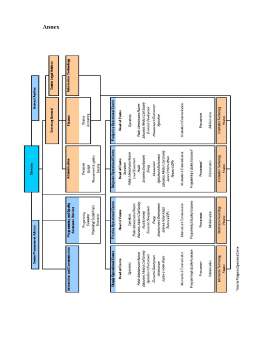Cuprins
- Introduction
- 1. Western Balkans – short istoric
- 2. EU and the Western Balkans
- 2.1 The European Union and Albania
- 2.2 The European Union and Croatia
- 2.3 The European Union and Serbia
- 2.4 The European Union and Montenegro
- 2.5 The European Union and Kosovo
- 2.6 The European Union and the Former Yugoslav Republic of
- Macedonia
- 3. The European Agency for Reconstruction
- 3.1 The objectives
- 3.2 The structure
- 4. The Agency’s work: country by country
- 4.1 Political context
- 4.2 Serbia
- 4.3 Montenegro
- 4.4 Kosovo
- 4.5 Former Yugoslav Republic of Macedonia
- 5. Agency-wide developments in 2007
- 6. Conclusions
- References
- Annex
Extras din proiect
Introduction
This paper aims to explain some basic elements of relationship between European Union and Western Balkans, from a perspective related to the economic reality of South Eastern European countries ; it analyses the role played by The European Agency for Reconstruction, the main EU assistance programme in some of the Western Balkans countries ( Serbia, Montenegro, Kosovo and the Former Yugoslav Republic of Macedonia), programme that contributed to their development and suggests some possible ways of improving the critical physical infrastructure, the environmental actions, and the strength of civil society. The paper has a clear economical and historical bias. Of course, many microeconomic, institutional, political and cultural factors may have been brought into the picture, as there are many relevant variables during such a complex phenomenon as transition. But focusing on one dimension at one time would limit the risk of hiding or omitting the essential mechanisms of relationship between this countries and the European Union.
The first section briefly recalls some basic informations about the Western Balkans countries. Section 2 comments on the relationship between EU and each country from South Eastern Europe.The next section explaines what is and which are the objectives of the European Agency for Reconstruction Section 4 analyses the Agency’s work country by country from the beginning of the transition process until 2006. The 5th section analyse in depth the Agency-wide developments in 2007.The conclusion and the implications of the European Union through European Agency for Reconstruction in Western Balkans are presented in the last Section.
1. Western Balkans
The Western Balkans is the term used by the European Union for the sub-region comprising Albania, Bosnia and Herzegovina, Croatia, the former Yugoslav Republic of Macedonia, and Serbia and Montenegro. Kosovo, under UN administration, is a province of Serbia. With the exception of Albania, the countries of the Western Balkans were formerly constituent republics of the old Federal Republic of Yugoslavia.
The 1990s were a turbulent decade in the Western Balkans, as the Federal Republic of Yugoslavia broke-up and new countries were created. Ethnic and civil wars affected all the countries of the region, either directly or indirectly, exacting a high price. Many thousands died, many more thousands were displaced and economies were devastated by conflict. The disruption delayed the process of reform and transition from command to market economies which other former Communist states in central and eastern Europe underwent during that decade. The Western Balkans today face unresolved conflict issues, serious post-conflict problems such as the prevalence of organised crime, and the challenge of constructing societies based on respect for human rights and the rule of law. Perhaps the greatest long term threat to stability is posed by economic underdevelopment, with persistently low levels of foreign investment and persistently high rates of unemployment.
2. EU and the Western Balkans
In the wake of the violent conflicts that marked the recent history of the Western Balkans region, the EU considers it a priority to promote the development of peace, stability, prosperity and freedom in the South Eastern European countries of Croatia, Serbia, Montenegro, Bosnia and Herzegovina, the Former Yugoslav Republic of Macedonia (FYROM) and Albania.
After Bulgaria and Romania become EU members, the entire western Balkan region are surrounded by Member States of the European Union. This has important repercussions for both the countries of the region and the EU in a number of areas, in particular where the free circulation of goods, services and persons are concerned.
2.1 The European Union and Albania
Albania, officially the Republic of Albania is a country in South Eastern Europe. Albania borders Greece to the south-east, Montenegro to the north, Serbia to the northeast, and the Republic of Macedonia to the east. It has a coast on the Adriatic Sea to the west, and on the Ionian Sea to the southwest.
Albania is a parliamentary democracy that is transforming its economy into a market-oriented system, a potential candidate for membership in the European Union and NATO.
Since 1991, the European Union has developed an active partnership with Albania in supporting its process of institutional, political and economic reform. The European Union was one of the first actors to provide humanitarian aid and financial support after the demise of the communist regime. Well aware of the difficulties encountered by Albania in the transition towards a democratic state and a functioning market economy, the European Union has shown continued commitment to encouraging a rapprochement between Albania and European values and standards.
At the Thessaloniki Summit (June 2003), the EU reaffirmed its commitment to the integration into the Union of the countries of the Western Balkans. Along with the other countries of the Western Balkans, Albania participates in the Stabilisation and Association process (SAP). Negotiations for a Stabilisation and Association Agreement (SAA) started on 31 January 2003 and are nearing completion.
Preview document
Conținut arhivă zip
- European Union - Western Balkans Relation.doc



























